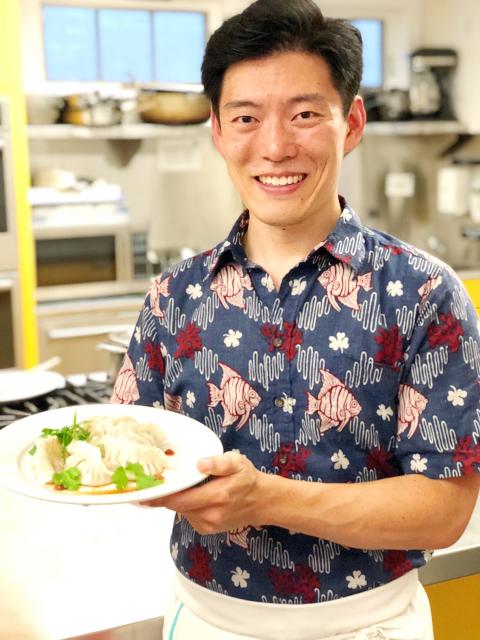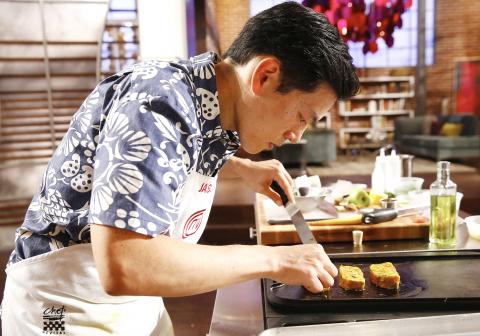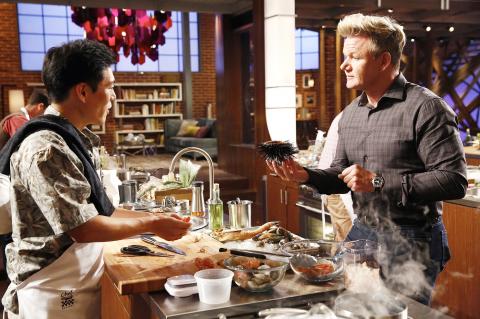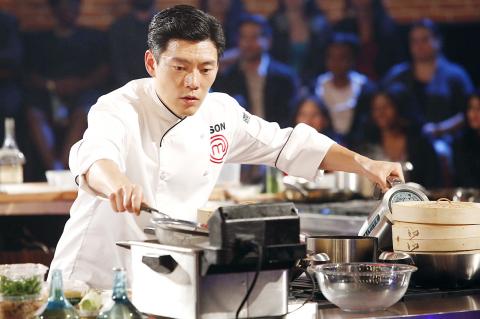Jason Wang (王凱傑) had already lost in the season finale of the reality TV cooking show MasterChef when things, as he put it, went “bonkers” in Taiwan.
Late last year, an online clip of the 35-year-old Taiwanese-American music teacher and classical tenor vocalist made the rounds showing a dish he prepared for one of the show’s challenges. In it, contestants learn the ingredients only after lifting up a mystery box.
“I was just jumping for joy because it was all very, very expensive seafood and shellfish,” Wang told the Taipei Times during a recent phone interview.

Photo courtesy of Jason Wang
Wang’s finished product, artistically plated, included shrimp, sea urchin roe wrapped in bok choy leaves and maitake mushroom (舞茸蘑菇), all of which were fried as a tempura.
But it was a clam soup — what Wang called an “elevated” gelitang (蛤蜊湯) — that won over the hearts of millions of Taiwanese who saw the video, not to mention his interaction with British celebrity chef Gordon Ramsay, one of the show’s judges known for his fiery temper and penchant for expletives.
“I kind of got choked up because when my parents came from Taiwan, they were grad students, they really didn’t have a lot of money,” Wang said. “So the types of ingredients that were here... were things that we had wanted to use but wouldn’t use because they were too expensive.”

Photo courtesy of FOX
Wang emerged as the runner-up in the final episode of season eight of MasterChef, which ended in September in the US and was broadcast on Fox. But that hasn’t at all dimmed his rising celebrity in Taiwan, where both of his parents grew up.
Wang recently wrapped up a visit to the island that included a Q&A with fans, appearances on television and a press conference with local Chinese-language media.
CIRCUITOUS PATH TO COOKING

Photo courtesy of FOX
Wang was an accidental chef and never envisioned himself as a success in the kitchen. His initial major in college was plant science. He dabbled in landscape architecture, hotel administration and eventually music, all in his junior year.
Wang ended up a music teacher, first in middle school, then at the Newton South High School in Massachusetts, where he has worked for the past four years, he said.
Food and a mission of spreading his love of it followed Wang all throughout his academic and professional career.

Photo courtesy of Greg Gayne and FOX
“Even in the classroom, when I’m doing music rehearsal, I’m always using food metaphors and using food descriptors,” he said.
A self-described big eater, Wang said he has always enjoyed food, having grown up around his grandparents who lived with his family for a time and who were often in the kitchen.
While they cooked Chinese food — Wang’s mother’s family is from Shanghai, his father’s from Beijing — the first dish Wang ever made, ironically enough, was an all American apple pie when he was 12 years old.
‘MASTERCHEF’
Things began to come full-circle for Wang after he learned of an open audition call in Boston for MasterChef in April 2016. His friends urged him to try out, he recalled.
After hesitating on the day of the audition, Wang joined the last group of 25, he said. The candidates entered a big ballroom and were given just three minutes to plate a dish they had brought with them, said Wang.
“I went there thinking that I’d just have an opportunity for someone, like an expert, to try my food,” Wang said. “I wasn’t necessarily thinking like, ‘Oh, I need to be on a TV show.’”
But following some interviews, ending up on a TV show is exactly what happened. Season eight of MasterChef began filming in Los Angeles in August 2016, and Wang was told to be prepared to stay for one week or as many as three months, he said.
Wang described Ramsay — the judge who fell in love with Wang’s clam soup, infectious smile and personality — as a “very imposing guy” with “very exacting standards.”
“Before even meeting him, I had a lot of respect for how seriously he took the art of cooking,” Wang said.
Since the season ended, Wang has surprised by the amount of attention he has received; his parents have been stupefied. But, at the same time, he said he understood the appeal of his now famous clam soup, and how praise from Ramsay put it on a “really visible international stage.”
“It’s a very iconic dish for a lot of Taiwanese folks, and it’s something very simple,” Wang said. “But it kind of sums up the whole Taiwan experience of being simple and delicious and pure and full of flavors.”
As for his future after MasterChef, Wang hasn’t ruled anything out. The educator in him said he has a sense of responsibility to share food knowledge with his audience. An Instagram account he started for the show and his Facebook page both have large followings.
“At the heart of it, I really want to make educating people my mission, regardless if it’s music or food,” he said.
Wang said his strong network of friends and family — including his mom, a nutritionist, and dad, a senior scientist at Philips — helps keep him grounded if things become too overwhelming.
This entire journey, Wang added, has also helped shape his identity as Taiwanese American.
“My parents came from Taiwan, and we grew up in New England, so I just felt like I was always me,” Wang said. “But I’ve realized now that I think because food connects people in such an intimate way that I am, in very many ways, super Taiwanese.”

William Liu (劉家君) moved to Kaohsiung from Nantou to live with his boyfriend Reg Hong (洪嘉佑). “In Nantou, people do not support gay rights at all and never even talk about it. Living here made me optimistic and made me realize how much I can express myself,” Liu tells the Taipei Times. Hong and his friend Cony Hsieh (謝昀希) are both active in several LGBT groups and organizations in Kaohsiung. They were among the people behind the city’s 16th Pride event in November last year, which gathered over 35,000 people. Along with others, they clearly see Kaohsiung as the nexus of LGBT rights.

Dissident artist Ai Weiwei’s (艾未未) famous return to the People’s Republic of China (PRC) has been overshadowed by the astonishing news of the latest arrests of senior military figures for “corruption,” but it is an interesting piece of news in its own right, though more for what Ai does not understand than for what he does. Ai simply lacks the reflective understanding that the loneliness and isolation he imagines are “European” are simply the joys of life as an expat. That goes both ways: “I love Taiwan!” say many still wet-behind-the-ears expats here, not realizing what they love is being an

In the American west, “it is said, water flows upwards towards money,” wrote Marc Reisner in one of the most compelling books on public policy ever written, Cadillac Desert. As Americans failed to overcome the West’s water scarcity with hard work and private capital, the Federal government came to the rescue. As Reisner describes: “the American West quietly became the first and most durable example of the modern welfare state.” In Taiwan, the money toward which water flows upwards is the high tech industry, particularly the chip powerhouse Taiwan Semiconductor Manufacturing Co (TSMC, 台積電). Typically articles on TSMC’s water demand

Every now and then, even hardcore hikers like to sleep in, leave the heavy gear at home and just enjoy a relaxed half-day stroll in the mountains: no cold, no steep uphills, no pressure to walk a certain distance in a day. In the winter, the mild climate and lower elevations of the forests in Taiwan’s far south offer a number of easy escapes like this. A prime example is the river above Mudan Reservoir (牡丹水庫): with shallow water, gentle current, abundant wildlife and a complete lack of tourists, this walk is accessible to nearly everyone but still feels quite remote.